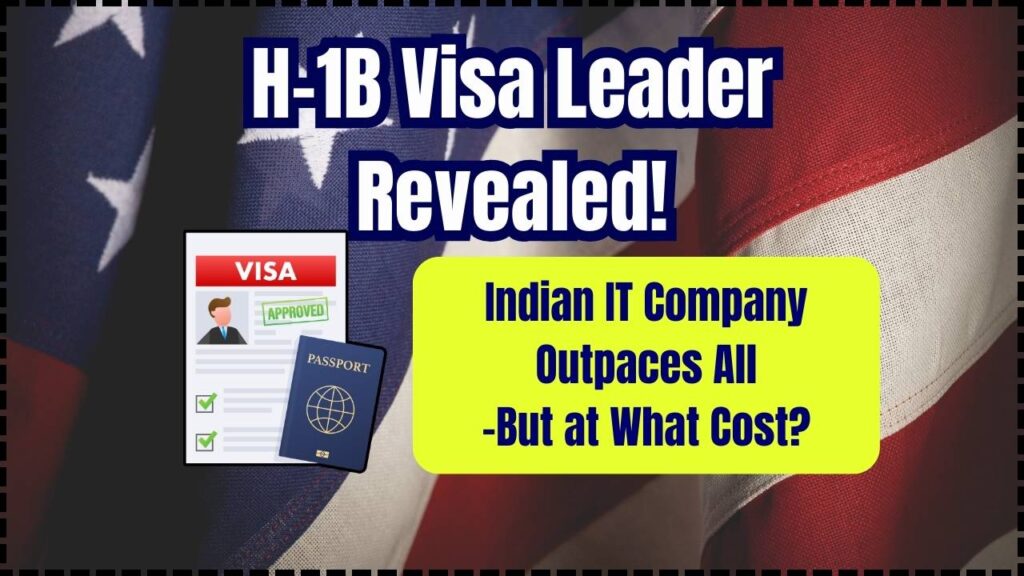
H-1B Visa Leader Revealed: In the world of global tech talent, 2024 brought a startling revelation: Infosys, a leading Indian IT services company, topped the charts in H-1B visa approvals, outpacing major global players like Amazon and Google. With 8,140 H-1B approvals—roughly 20% of all issued visas—Infosys solidified its dominance in the U.S. outsourcing landscape. But this success story comes with significant debate. Is this a win for international collaboration—or a threat to American workers? Let’s break it down.
H-1B Visa Leader Revealed
The news that Infosys leads all companies in H-1B approvals is more than a headline—it’s a signal of a shifting global workforce. While it showcases India’s tech strength, it also ignites conversations around workforce equity, wage fairness, and the future of U.S. tech jobs. A balanced H-1B program should empower innovation without exploitation, opportunity without displacement, and collaboration without compromise.
| Category | Details |
|---|---|
| H-1B Visa Cap (FY 2024) | 85,000 total (65,000 regular + 20,000 advanced degree) |
| Top H-1B Sponsor (FY 2024) | Infosys – 8,140 visas approved |
| Other Major Sponsors | Amazon, TCS, Cognizant, Google, Meta, Microsoft |
| Top Nationality of Applicants | India – Over 70% of all H-1B visa holders |
| Common Job Roles | Software developers, data scientists, systems analysts, engineers |
| Controversies | Allegations of wage suppression, displacement of American workers, discrimination lawsuits |
| Official USCIS H-1B Info | https://www.uscis.gov/working-in-the-united-states/h-1b-specialty-occupations |
What is the H-1B Visa Program?
The H-1B visa allows U.S. employers to temporarily hire foreign workers in specialty occupations—primarily tech, engineering, finance, and medicine. These positions typically require highly specialized knowledge and a bachelor’s degree or higher.
Every fiscal year, the U.S. government offers 85,000 H-1B visas, with 20,000 reserved for advanced degree holders from U.S. institutions. Demand far outpaces supply, leading to a lottery system to select eligible applications.
Why Infosys and Other Indian IT Companies Becomes H-1B Visa Leader?
Infosys, Tata Consultancy Services (TCS), and Wipro have long leveraged the H-1B program to deploy skilled workers to the U.S. on temporary assignments. Here’s why they succeed:
1. Business Model Based on Global Delivery
Indian IT firms follow an offshore-onsite model, where large teams in India support smaller, client-facing teams in the U.S. These onsite teams are staffed using H-1B holders.
2. Specialized Tech Talent
India’s engineering education system produces over a million STEM graduates annually, many of whom have hands-on experience in global software solutions.
3. Cost Efficiency
Employing H-1B workers can be 30-40% more cost-effective than hiring U.S. citizens, especially for entry- to mid-level roles.
But At What Cost?
While Infosys’s rise is impressive, it sparks concern among American professionals, policymakers, and advocacy groups.
1. Workforce Displacement
Several studies, including those by the Economic Policy Institute (EPI), suggest that outsourcing firms often pay H-1B workers less than local workers, creating downward pressure on wages and fewer opportunities for U.S. graduates.
2. Legal Scrutiny
- In 2013, Infosys paid $34 million to settle allegations of visa fraud.
- In 2024, Cognizant faced a federal lawsuit for favoring Indian and South Asian workers, highlighting concerns over nationality-based discrimination.
3. Ethical Questions
The rise in H-1B approvals for outsourcing firms versus American tech giants like Apple and Meta raises ethical issues. Is the program serving its original purpose—to fill gaps in U.S. talent—or simply becoming a tool for cheaper labor?
What It Means for U.S. Professionals?
If you’re a U.S.-based tech worker, these trends affect your career in multiple ways:
- More competition for entry-level tech jobs
- Pressure on wages, especially in outsourcing-heavy regions
- Opportunities to reskill in niche areas like AI, cybersecurity, and cloud architecture—roles less likely to be outsourced
Practical Advice:
- Focus on specializations that are harder to outsource
- Stay updated on immigration trends
- Network with firms that emphasize domestic talent development
What It Means for Indian Tech Talent?
For Indian students and professionals, Infosys’s H-1B dominance signals continued opportunity.
Steps to Secure an H-1B Visa:
- Earn a bachelor’s degree (preferably in STEM)
- Secure a U.S. employer sponsor
- Participate in the USCIS H-1B lottery
- If selected, complete Form I-129 and await visa processing
Top Employers for Indian Applicants:
- Infosys
- TCS
- Wipro
- HCL Technologies
- Amazon and Google (in select roles)
A Closer Look at the Numbers
According to USCIS data:
- Nearly 72% of H-1B visas in 2024 were issued to Indian nationals
- Infosys alone held nearly 10% of all approvals, ahead of Amazon (~7,700), TCS (~7,000), and Cognizant (~6,500)
This growing concentration of approvals in a handful of outsourcing companies is prompting the Biden administration to consider reforms. Proposals include:
- Prioritizing higher salaries in the lottery
- Preventing “gaming” by multiple related company submissions
- Stricter audits of outsourcing-heavy firms
H-1B Visa Rules Updated for 2025 – Key Changes & Application Timeline!
H-1B Visa 2026: New Registration Rules You Must Know Before March 24!
Dreaming of Working in the USA? H-1B Visa 2026 Registration Starts March 7!
FAQs: H-1B Visa & Indian IT Companies
Q1: Why do Indian companies get more H-1B visas than others?
Indian IT firms apply in large numbers through offshore-onsite business models, which require frequent travel and client presence.
Q2: Is it legal to outsource H-1B jobs?
Yes, but firms must comply with U.S. wage laws and anti-discrimination rules. Violations can lead to penalties or bans.
Q3: Can Americans apply for the same roles?
Absolutely. In fact, companies are encouraged to first look locally. But due to skill shortages in some areas, H-1B talent fills the gap.
Q4: Will H-1B rules change in 2025?
Possibly. USCIS has proposed reforms focusing on merit-based selection, transparency, and higher wages.







